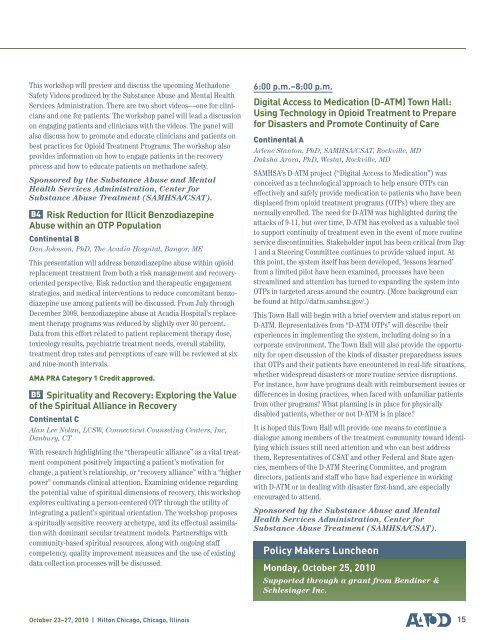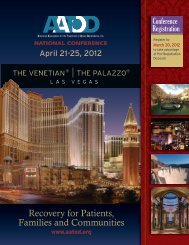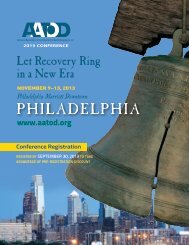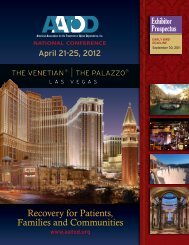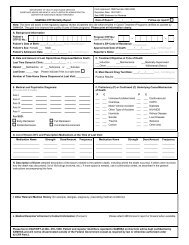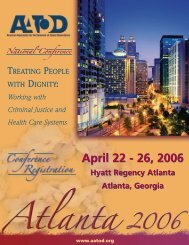Final Conference Program - aatod
Final Conference Program - aatod
Final Conference Program - aatod
Create successful ePaper yourself
Turn your PDF publications into a flip-book with our unique Google optimized e-Paper software.
This workshop will preview and discuss the upcoming Methadone<br />
Safety Videos produced by the Substance Abuse and Mental Health<br />
Services Administration. There are two short videos—one for clinicians<br />
and one for patients. The workshop panel will lead a discussion<br />
on engaging patients and clinicians with the videos. The panel will<br />
also discuss how to promote and educate clinicians and patients on<br />
best practices for Opioid Treatment <strong>Program</strong>s. The workshop also<br />
provides information on how to engage patients in the recovery<br />
process and how to educate patients on methadone safety.<br />
Sponsored by the Substance Abuse and Mental<br />
Health Services Administration, Center for<br />
Substance Abuse Treatment (SAMHSA/CSAT).<br />
B4 Risk Reduction for Illicit Benzodiazepine<br />
Abuse within an OTP Population<br />
Continental B<br />
Dan Johnson, PhD, The Acadia Hospital, Bangor, ME<br />
This presentation will address benzodiazepine abuse within opioid<br />
replacement treatment from both a risk management and recoveryoriented<br />
perspective. Risk reduction and therapeutic engagement<br />
strategies, and medical interventions to reduce concomitant benzodiazepine<br />
use among patients will be discussed. From July through<br />
December 2009, benzodiazepine abuse at Acadia Hospital’s replacement<br />
therapy programs was reduced by slightly over 30 percent.<br />
Data from this effort related to patient replacement therapy dose,<br />
toxicology results, psychiatric treatment needs, overall stability,<br />
treatment drop rates and perceptions of care will be reviewed at six<br />
and nine-month intervals.<br />
AMA PRA Category 1 Credit approved.<br />
B5 Spirituality and Recovery: Exploring the Value<br />
of the Spiritual Alliance in Recovery<br />
Continental C<br />
Alan Lee Nolan, LCSW, Connecticut Counseling Centers, Inc,<br />
Danbury, CT<br />
With research highlighting the “therapeutic alliance” as a vital treatment<br />
component positively impacting a patient’s motivation for<br />
change, a patient’s relationship, or “recovery alliance” with a “higher<br />
power” commands clinical attention. Examining evidence regarding<br />
the potential value of spiritual dimensions of recovery, this workshop<br />
explores cultivating a person-centered OTP through the utility of<br />
integrating a patient’s spiritual orientation. The workshop proposes<br />
a spiritually sensitive recovery archetype, and its effectual assimilation<br />
with dominant secular treatment models. Partnerships with<br />
community-based spiritual resources, along with ongoing staff<br />
competency, quality improvement measures and the use of existing<br />
data collection processes will be discussed.<br />
6:00 p.m.–8:00 p.m.<br />
Digital Access to Medication (D-ATM) Town Hall:<br />
Using Technology in Opioid Treatment to Prepare<br />
for Disasters and Promote Continuity of Care<br />
Continental A<br />
Arlene Stanton, PhD, SAMHSA/CSAT, Rockville, MD<br />
Daksha Arora, PhD, Westat, Rockville, MD<br />
SAMHSA’s D-ATM project (“Digital Access to Medication”) was<br />
conceived as a technological approach to help ensure OTPs can<br />
effectively and safely provide medication to patients who have been<br />
displaced from opioid treatment programs (OTPs) where they are<br />
normally enrolled. The need for D-ATM was highlighted during the<br />
attacks of 9-11, but over time, D-ATM has evolved as a valuable tool<br />
to support continuity of treatment even in the event of more routine<br />
service discontinuities. Stakeholder input has been critical from Day<br />
1 and a Steering Committee continues to provide valued input. At<br />
this point, the system itself has been developed, ‘lessons learned’<br />
from a limited pilot have been examined, processes have been<br />
streamlined and attention has turned to expanding the system into<br />
OTPs in targeted areas around the country. (More background can<br />
be found at http://datm.samhsa.gov/.)<br />
This Town Hall will begin with a brief overview and status report on<br />
D-ATM. Representatives from “D-ATM OTPs” will describe their<br />
experiences in implementing the system, including doing so in a<br />
corporate environment. The Town Hall will also provide the opportunity<br />
for open discussion of the kinds of disaster preparedness issues<br />
that OTPs and their patients have encountered in real-life situations,<br />
whether widespread disasters or more routine service disruptions.<br />
For instance, how have programs dealt with reimbursement issues or<br />
differences in dosing practices, when faced with unfamiliar patients<br />
from other programs What planning is in place for physically<br />
disabled patients, whether or not D-ATM is in place<br />
It is hoped this Town Hall will provide one means to continue a<br />
dialogue among members of the treatment community toward identifying<br />
which issues still need attention and who can best address<br />
them. Representatives of CSAT and other Federal and State agencies,<br />
members of the D-ATM Steering Committee, and program<br />
directors, patients and staff who have had experience in working<br />
with D-ATM or in dealing with disaster first-hand, are especially<br />
encouraged to attend.<br />
Sponsored by the Substance Abuse and Mental<br />
Health Services Administration, Center for<br />
Substance Abuse Treatment (SAMHSA/CSAT).<br />
Policy Makers Luncheon<br />
Monday, October 25, 2010<br />
Supported through a grant from Bendiner &<br />
Schlesinger Inc.<br />
October 23–27, 2010 | Hilton Chicago, Chicago, Illinois 15


